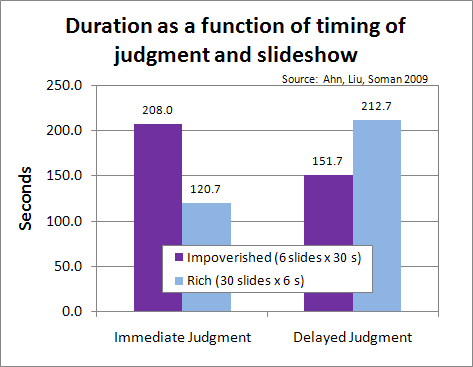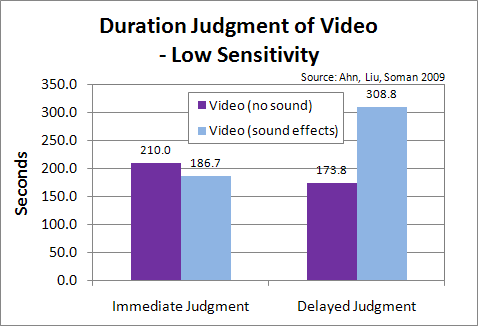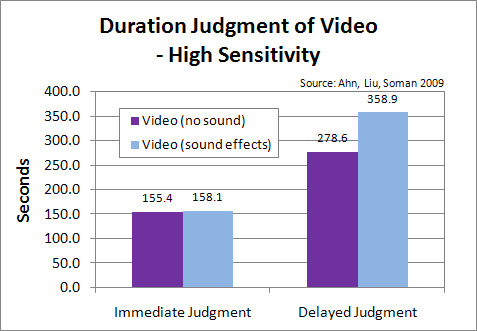Online marketing has evolved from selling products to creating engaging experiences for consumers. New research shows that how long these experiences seem to last, however, depends on how rich the experience and time of recall (Ahn, Liu, and Soman 2009). The “memory marker” model helps explain this phenomenon and the time distortion that some people experience during and after immersive online flow experiences. Web developers need to balance the need to create rich online experiences with tolerable download times and scant distractions.
Memory Markers and Experience Slicing
What makes some experiences fleeting while others seem to last forever? Researchers from the University of Toronto found that during an experience the mind creates and encodes “memory markers” of specific episodes. After a delay the mind retrieves these markers to reconstruct the experience and make judgments. The more vivid and rich the experience, the more markers we file away and the faster time seems to pass. The more impoverished the experience, the fewer markers we file away and the slower time passes. However, these effects reverse after a significant delay. Because of the larger number of memory markers that we retrieve, we recall vivid experiences taking longer. We recall less vivid experiences passing by quickly with fewer markers to recall.
Mitigating Factors of Memory Marker Creation and Recall
The researchers show that there are factors such as ego-depletion and cognitive load which inhibit the encoding or retrieving of markers, which shortens the subjective duration of an experience after a delay. Inhibiting mental capacity at the retrieval stage (for example, an extra mental memorization task) inhibits memory marker retrieval. This leads to shorter duration judgments. Conversely, sensitivity to changes in the environment increases the number of markers recalled, prolonging the estimated duration of an experience.
Testing the Subjective Duration of Rich versus Impoverished Experiences
To test their theory, the researchers ran a series of experiments on a number of students. To show the effects of rich versus impoverished experience on subjective duration, they displayed two slideshows to students. The participants estimated the duration of the slideshows both immediately after viewing and three days after the event. The results are shown in Figure 1.
Both slideshows lasted 180 seconds. They each showed a series of photographs to the participants. The rich slideshow showed 30 slides for 6 seconds each. The impoverished slideshow showed 6 slides for 30 seconds each. Immediately following the event, participants estimated a longer duration (208 seconds) when the number of slides was small, and a shorter duration when the number of slides was large (120.7 seconds). The test subjects in the delayed condition (3 days after the event) flipped their estimates, however, perceiving the duration of the event to be longer for the larger number of slides (212.7 seconds) and shorter for the fewer number of slides (151.7 seconds). The researchers found similar results when the total number of unique slides was held constant and shown in a repeated pattern (11111, 22222, 33333) or in sequence (12345, 32154, 13524 etc).
Rich versus Impoverished Video Duration
To replicate the slideshow test with different stimuli, the researchers tested the subjective duration of two video clips. They also tested whether the effect of external stimuli could moderate the number of markers taken during the experience, which would impact the delayed duration judgment. The video clip shown was a short documentary film in which the Harry Potter movie production team explained the making of the fireworks sequence in the movie. One clip was without sound, and the other clip included sound for the fireworks. Half of the partipants were asked to pay attention to every detail and write down suggestions for the production team for improvement (high sensitivity) whereas the other half of participants were told to think about the general theme of the video and write down possible titles (low sensitivity condition). The results are shown in Figures 2 and 3.
Figure 2 shows the low sensitivity condition. Immediately after viewing the video clips, users estimated that the duration of the silent video was longer (210 seconds) and the video with sound was shorter (186.7 seconds). After a delay of 3 days, these subjective duration judgments flipped, with the silent video remembered as shorter (173.8 seconds), and the rich video remembered as longer (308.8 seconds). These findings are similar to what the researchers found in the slide show test (see Figure 1).
Figure 3 shows what happened when subjects were asked to pay attention to everything and write things down (high sensitivity). Immediately after viewing the videos, both subjective duration estimates were essentially the same (155.4 seconds and 158.1 seconds for the silent/audible videos respectively). After a delay, the results were similar to the low sensitivity situation only less pronounced, with the silent version estimated to be 278.5 seconds long. The enhanced video with sound was remembered as being longer at 358.9 seconds in duration.
Conclusion
This research shows that the subjective duration of experiences can vary depending on the richness of the experience, cognitive load, sensitivity to the environment, and time of recall. During an event, rich experiences seem to pass by quickly, while impoverished experiences seem to drag along. How we create and recall memory markers of experiences helps to explain why our subjective judgments of the duration of events can flip after a significant delay. Well after an event, humans tend to overestimate the duration of rich experiences because they recall more memory markers. Humans underestimate the duration of impoverished experiences because they recall fewer memory markers. These findings may help explain the time distortion that most people report during a “flow state” experience created by rich, absorbing websites. Web developers need to balance the need to create rich, immersive experiences with tolerable download times and need to minimize distractions when designing interactive Web 2.0 website applications.
Further Reading
- Ahn, H-K, Liu, M., and D. Soman 2009, “Memory markers: How consumers recall the duration of experiences,”
- Journal of Consumer Psychology 19 (2009) 508-516. “The human mind generates and encodes ‘memory markers’ of specific episodes, stores them in memory, and after a temporal delay retrieves these markers to reconstruct the experience and make relevant judgments. Rich experiences characterized by vivid stimuli seem to pass by quickly, yet feel longer when recalled after a period
of time because the number of retrieved memory markers is large.” These University of Toronto researchers found that for rich experiences time passes quickly during the event, and for impoverished experiences time seems to pass slowly during the event. However, after a significant delay (3 days) the subjective duration of rich experiences seems longer due to the increase in memory markers, while the subjective duration of impoverished experiences seems shorter. - King, A. 2003, “Flow in Web Design,”
- Summary of Chapter 2 in Speed Up Your Site: Web Site Optimization, New Riders Publishing.
- Schmitt, B. 2003. Customer experience management: A revolutionary
approach to connecting with your customers, - Hoboken, New Jersey: John
Wiley & Sons.




I would strongly recommend anyone who cares about maximizing the users experience read this. Much of the article I intuitively knew already but it articulated the points in a way that really helped me expand on them and think how to improve my site.